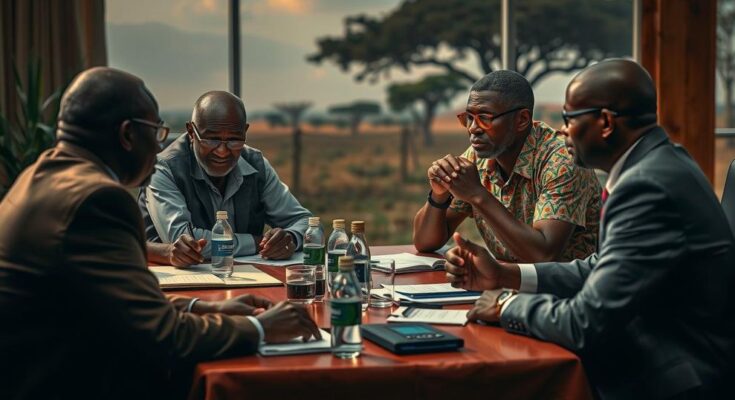South Sudan’s President Salva Kiir confirmed that the Tumaini talks with hold-out groups aim to integrate their concerns into the existing Revitalized Peace Agreement, not replace it. He emphasized the need for urgency in negotiations and preparations for the December 2026 elections. The ongoing humanitarian crisis necessitates collaboration to ensure effective aid access, as South Sudan faces severe challenges including food insecurity and flooding.
President Salva Kiir Mayardit of South Sudan reaffirmed his commitment to the Tumaini peace negotiations aimed at hold-out groups in Nairobi, Kenya. He emphasized that these discussions are not intended to replace or undermine the existing Revitalized Peace Agreement. Instead, the focus is on bridging differences and integrating the hold-out groups’ concerns into the current agreement, thereby promoting inclusivity and preventing further conflict.
During the opening of the 8th annual Governor’s Forum in Juba, President Kiir stated, “Our collective vision, we the signatories to the 2018 peace agreement, is to bridge the gap, to understand the reservations of the hold-out groups.” He insisted that a new agreement would contradict the principles of inclusivity and could trigger a resurgence of conflict.
Additionally, the restructuring of the government delegation involved in the Tumaini talks aims to expedite and finalize the negotiation process. Nicholas Haysom, the Special Representative of the Secretary-General of the United Nations, noted that extending the transitional period for two years and delaying elections was regrettable yet necessary due to insufficient progress on critical factors within the agreement.
Haysom remarked, “What is needed now is a clear, realistic, harmonised work plan for the next two years” to enhance the urgency of fulfilling commitments made to South Sudan’s populace. He emphasized that the extension was motivated by a collective aspiration for enduring peace and highlighted the importance of preparing for the upcoming elections scheduled for December 2026.
The forum holds significance as South Sudan grapples with pressing issues, including acute humanitarian needs exacerbated by flooding, insecurity, and widespread food shortages. Deputy Special Representative Anita Kiki Gbeho underscored the necessity for leaders to ensure unhindered access for humanitarian operations, stating that challenges still persist, including violence against aid workers and logistical barriers to effective response.
The Tumaini peace negotiations are a pivotal initiative under South Sudan’s broader peace process, which stemmed from the Revitalized Peace Agreement signed in 2018. This agreement aimed to end years of conflict and establish a framework for governance, security, and socio-economic recovery. The presence of hold-out groups poses challenges to achieving lasting peace, prompting initiatives such as Tumaini to address grievances and integrate various factions into the peace framework. In the context of ongoing instability, severe humanitarian crises, and economic hardship, these negotiations are essential for fostering inclusivity and building a sustainable future for South Sudan.
In conclusion, President Salva Kiir Mayardit’s commitment to the Tumaini peace negotiations signals a crucial step towards integrating hold-out groups into the existing peace framework, thereby promoting stability in South Sudan. The call for a structured approach to the transitional period and the emphasis on humanitarian access underscores the urgency of proactively addressing the diverse challenges facing the nation. As stakeholders gather to work towards genuine peace, their collective efforts will significantly influence the trajectory of South Sudan’s future.
Original Source: www.socialnews.xyz




